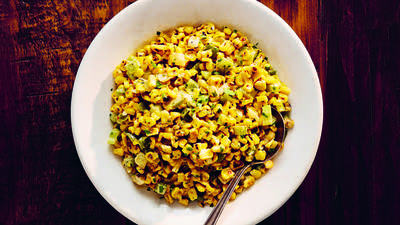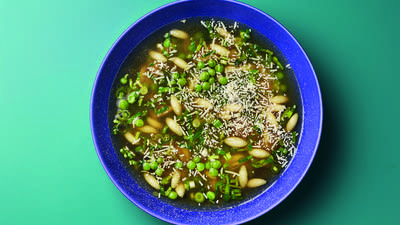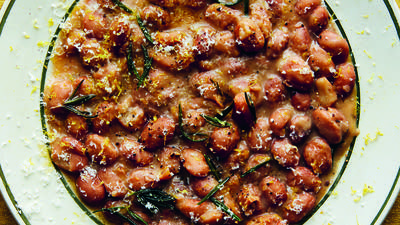
Bob La Mar is a farmer -- but his tractor is a boat.
“We've got a little window this morning to harvest and then that will be it,” La Mar says.
He's heading to his favorite harvesting spot before the waters off the Mendocino, Calif., coast get too rough.
“OK, this looks about right,” he says.
He turns off the engine about 3 miles from the Point Arena Pier.
“Isn't that beautiful?” La Mar says. “Just being out here and it's nice and quiet. We're over a canyon called Arena Canyon.”
 Bob La Mar harvesting seawater on his boat
Bob La Mar harvesting seawater on his boat
La Mar farms salt and he harvests ocean water. But not just any water: He says the currents here push mineral-rich, highly saline water from the canyon up to the surface, which gives this salt a unique flavor.
“I call it merroir, like terroir is for wine,” La Mar says. “Wine will take on the flavors and the characteristics of where the grapes are grown. We believe that salt has a merroir or an ocean flavor.”
He throws an intake hose into the water, another line into a 200-gallon tank on the boat, and starts a pump to harvest the seawater. On a typical day he'll make nine trips out in his boat, delivering a total of 1,800 gallons of water to holding tanks at his house in Gualala on the southern Mendocino coast.
La Mar sounds upbeat now, but 3 years ago, he and his wife, Lora, were depressed. They'd closed their sport fishing business right when the recession started and didn't know what was next. For a break, they decided to take a trip to San Francisco and found themselves in a gourmet food store.
“I was looking at a wall of salts,” Lora La Mar says.
“A dozen, at least, sea salts from all around the world,” Bob says.
“Wait a minute -- where is the North coast salt?” Lora says.
“And we both stood there like children in front of a window at a candy store at Christmastime,” Bob says.
“And it was like, ‘Oh my gosh. We're going to make our own salt,’” Lora says.
“It was instantaneous,” Bob says.
“I'll never forget that moment,” Lora says. “So, we went home and put our rubber boots on.”
“We went down to Schooner Gulch Beach and got a 5-gallon bucket of salt water and that's how it started,” Bob says.
But that first batch tasted terrible and looked like popcorn. And that started the La Mars on a research and testing mission. Lora ordered salts from around the world. Bob consulted scientists. They scoured websites for clues. And they made batches and batches of salt.
“We were truly like mad scientists in there,” Lora says. “We had salt everywhere. It was in the drawers. It was in the dogs. I'd find salt everywhere.”
It took Bob months to make a batch that met with Lora’s high standards. She'd been a caterer and had experimented with seasoning blends for decades. They launched La Mar's Mendocino Sea Salt and Seasoning Company. Bob collected temperature and humidity data meticulously to arrive at a formula that works every time. He guards the exact numbers carefully.
In what he calls the salt shed, Bob boils seawater down to create a concentrated brine.
“It just gets gin clear,” Bob says.
Then it bakes in a special oven for over 20 hours. Salt crystals form on the surface and fall to the bottom of the baking pan.
“Once I get the salt pan driven, it's like snow so they're all spinning and falling like snowflakes,” Bob says.
He lets the salt drain for a few days, siphoning off extra liquid.
The La Mars sell their regular and smoked salts and seasoning blends at markets and food festivals from Mendocino to Marin. They frequently make the 5-hour trek from their home in Gualala to the Marin Civic Center farmers market.
Heather Manning is here because she tried a pinch of the salt at a friend’s house.
“I'm so excited to finally get to see you,” Manning says.
“Good, thank you,” Bob says. “I'm glad we're here for you.”
“We actually did a saute with kale and then we added a little bit of your sea salt at the very end,” Manning says. “It was so good.”
It's conversations like this that get the La Mars most of their business from neighborhood retail outlets to some of California's most lauded restaurants like Cyrus in Healdsburg. Back at home, Lora, who says she's an eternal optimist, keeps a memento on her desk just in case she gets discouraged -- a jar of that first terrible salt that looks like popcorn.
“I'll look at it sometimes for inspiration and go, ‘Okay, that's where we started. Here's where we are and I know we need to be there. We will be in time.’ Lora says.
And the numbers seem to bear this out. The La Mars say business is doubling every year.
Before you go...
Each week, The Splendid Table brings you stories that expand your world view, inspire you to try something new, and show how food connects us all. We rely on your generous support. For as little as $5 a month, you can have a lasting impact on The Splendid Table. And, when you donate, you’ll join a community of like-minded individuals who love good food, good conversation, and kitchen companionship. Show your love for The Splendid Table with a gift today.
Thank you for your support.
Donate today for as little as $5.00 a month. Your gift only takes a few minutes and has a lasting impact on The Splendid Table and you'll be welcomed into The Splendid Table Co-op.




